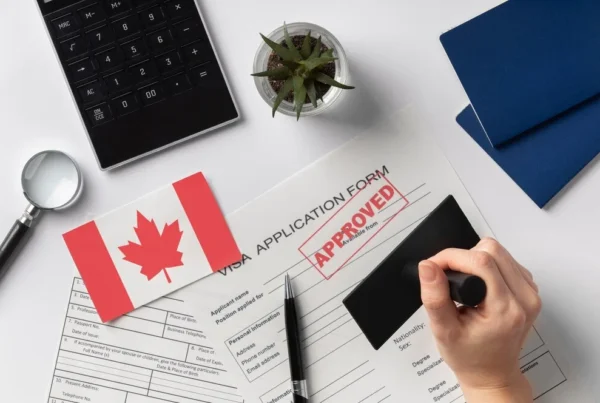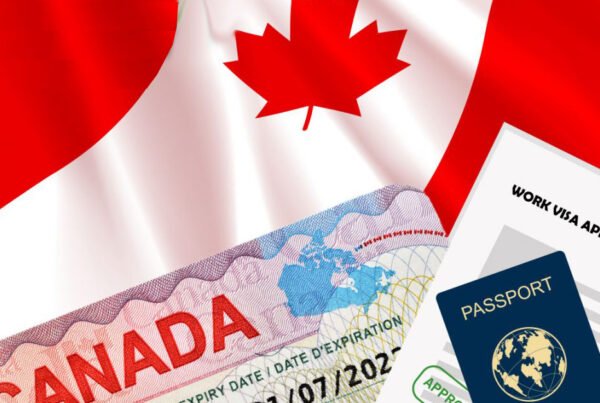When it comes to traveling to Canada with minor children, understanding the entry requirements is essential for a seamless experience. From the necessary documentation to managing the ETA process for minors, there are vital steps to follow. Making sure you have all the correct paperwork in place and understanding the guidelines for minor travelers can make all the difference at the border. But what exactly are these guidelines, and how can you best handle them to guarantee a smooth entry process? Stay tuned to discover the key insights for traveling with minor children to Canada.
Key Takeaways
- Minors must have an ETA when traveling to Canada, regardless of age.
- Parental consent is required for minors applying for an ETA.
- Each minor traveler needs their own ETA; cannot be included in a parent’s application.
- Verify all ETA details for minors to prevent border delays.
- Prepare and submit the ETA well in advance for a smooth entry process.
Minor Children Entry Requirements
When traveling to Canada with minor children, it’s essential to understand the entry requirements for minor children travelling to canada to ensure a smooth and hassle-free experience. Travel companions and guardians play an important role in ensuring that all necessary criteria are met for entry into Canada.
Entry restrictions and exemptions are key factors to keep in mind when traveling with minors.
When traveling with minor children to Canada, it’s important to have the proper documentation for both the children and their accompanying adults. Minors traveling without both parents or legal guardians may be required to present a notarized letter of consent from the absent parent(s) to enter the country. This letter should outline the details of the trip, including the dates of travel, the accompanying adults, and contact information for the absent parent(s).
Certain exemptions may apply to entry requirements for minors traveling to Canada. For example, minors who are Canadian citizens or permanent residents may have different entry criteria compared to foreign national minors.
Understanding these exemptions and requirements can help prevent any delays or issues at the border.
Necessary Documentation for Minors
You must make sure your minor children meet the age requirements and have the necessary parental consent forms when traveling to Canada.
Make sure to bring along proof of your relationship with each child to avoid any complications during the entry process.
These documents are essential for a smooth and hassle-free entry for your minors.
Age Requirements for Minors
To guarantee smooth entry into Canada, minors must have the necessary documentation for their age requirements in place. When traveling to Canada, it’s important to be aware of the age restrictions that apply to minors.
Different age groups may have specific rules and regulations they must adhere to in order to enter the country. It’s essential to make sure that all required consent forms are completed and signed by the appropriate parties before traveling with minors.
These forms may include parental consent forms, notarized letters of permission, or other legal documents depending on the age of the minor and the circumstances of their travel. Failure to comply with these age requirements and consent forms could result in delays or even denial of entry at the Canadian border.
Therefore, it’s highly recommended to thoroughly review and prepare all necessary documentation well in advance of your trip to avoid any issues during your travel to Canada.
Parental Consent Forms
Parental consent forms are essential documentation required for minors traveling to Canada. These forms serve as proof of consent from the legal guardians for the minor to travel and enter Canada. Notarized forms are often necessary to guarantee the validity and authenticity of the consent provided. It is vital for minors traveling without both parents to have these forms, especially if they are accompanied by someone who is not their legal guardian. This helps prevent any issues related to guardianship and ensures smooth travel arrangements.
To provide a clearer understanding, below is a table highlighting the key points regarding parental consent forms for minors traveling to Canada:
| Aspect | Description |
|---|---|
| Purpose | Provide proof of consent from legal guardians |
| Notarization | Often required for validity of the consent |
| Guardianship | Ensures legal authority for the minor’s travel |
| Legal Guardians | Must provide consent for the minor’s journey |
| Travel Arrangements | Facilitated by having the necessary documentation |
Proof of Relationship
When traveling to Canada, providing proof of relationship is a necessary step, particularly for minors entering the country. To guarantee a smooth entry process with your minor children, make sure to have the following documentation ready:
- Relationship evidence: Carry documents such as marriage certificates or adoption papers to substantiate the relationship between the minor and their accompanying adults.
- Legal guardians: If the minor is traveling with someone who isn’t their parent, have notarized letters from the legal guardians stating permission for the trip.
- Sibling verification: If minors are siblings traveling together, provide birth certificates showing the relationship.
- Birth certificates: Have original or certified copies of the minors’ birth certificates to confirm their age and parentage.
- Consent forms: Fill out any required consent forms, especially if one parent isn’t accompanying the minor, to validate permission for the trip.
Ensuring you have these documents will help facilitate the entry process for minors traveling to Canada.
Age Restrictions and Exceptions
Children under the age of 18 must meet specific requirements when entering Canada, with some exceptions based on their age. When it comes to age exceptions, minors under the age of 18 are usually considered children and may face certain travel restrictions when entering Canada alone. Keep in mind that children under the age of 18 traveling to Canada may require additional documentation or authorization depending on their age and circumstances.
For minors under the age of 16, it’s generally required that they’ve the consent of a parent or guardian when traveling to Canada. This consent may be in the form of a letter or other official documentation to safeguard the child’s safety and well-being during their stay in the country.
Minors between the ages of 16 and 18 might also need parental consent depending on the specific circumstances of their trip. In some cases, minors traveling with a school or organized group may be exempt from certain travel restrictions or additional requirements.
However, it’s always advisable to check with the Canadian authorities or your travel agent to make sure that all necessary documentation and permissions are in place before the minor’s trip to Canada.
Parental Consent Guidelines
To guarantee a smooth entry process for minors under 18 entering Canada, make sure you have the necessary consent documentation from a parent or guardian. When traveling with minors, it’s important to make sure that you have all the required paperwork to avoid any delays or complications at the border. Here are some important guidelines to keep in mind:
- Consent Forms: It’s important to have a notarized consent form signed by the child’s parent or legal guardian, authorizing the minor to travel to Canada.
- Verification Process: Canadian border officials may request to see the consent form, so it’s crucial to carry a physical or electronic copy during your travels.
- Legal Guardianship: If the minor isn’t traveling with both parents, additional documentation proving legal guardianship or custody may be necessary.
- Travel Restrictions: Be aware of any specific travel restrictions or requirements for minors entering Canada, as these can vary based on the child’s nationality or the purpose of their visit.
- Communication: Make sure that both the child and accompanying adult are aware of the consent arrangements and have contact information readily available in case of any inquiries.
Traveling Alone as a Minor
Guarantee a hassle-free journey for your minor by understanding the specific guidelines and requirements for traveling alone as a minor in Canada.
When your child is traveling alone, it’s important to take into account safety precautions and plan accordingly. Make sure your minor has reliable traveling companions who can assist them throughout their journey. It’s advisable to choose individuals who are familiar with the travel process and can provide support if needed.
Additionally, make use of airport assistance services to enhance your child’s travel experience. These services can offer guidance through security and immigration procedures, easing any potential stress for your minor.
Establish a clear communication plan with your child before their departure. Provide them with essential contact information, including your own, as well as emergency numbers they can reach out to in case of any issues.
Understanding Eta for Minors
When traveling to Canada with minors, it’s essential to understand the Electronic Travel Authorization (ETA) requirements for their entry. The ETA process for minor travelers is vital to guarantee a smooth entry into the country. Here are some key points to keep in mind:
- Age Requirement: Minors, including infants and children, are also required to have an ETA when traveling to Canada.
- Parental Consent: Minors must have the consent of a parent or guardian to apply for an ETA. The application process may vary based on the age of the child.
- Individual Applications: Each minor traveler must have their own ETA. It isn’t possible to include them in a parent’s or guardian’s application.
- Validity Period: The ETA for minors is usually valid for up to five years or until the passport expires, whichever comes first.
- Travel Purpose: The ETA process for minors may differ based on the purpose of their visit, such as tourism, study, or family visits.
Understanding these aspects of the ETA process for minor travelers is crucial to ensure a hassle-free entry into Canada. Make sure to complete the necessary requirements and plan ahead to avoid any last-minute issues during your travel with minors.
Tips for Smooth Entry Process
To guarantee a smooth entry process for your minor children into Canada, make sure you have all the required documents in order.
Additionally, take note of helpful tips for preparing your ETA application to avoid any delays or issues upon arrival.
Required Documents for Minors
Make sure to have all necessary documents ready for your minor child’s smooth entry into Canada. When traveling with minors, it’s crucial to make sure you have the correct paperwork to avoid any delays or issues at the border.
Here are some key documents you should have for your minor child:
- Passport Verification: Verify your child’s passport is valid and up-to-date before traveling to Canada.
- Birth Certificate: Carry a copy of your child’s birth certificate to confirm their age and identity.
- Parental Consent Letter: If your child is traveling without both parents, a letter of consent from the absent parent(s) is recommended.
- Visa or eTA: Depending on your child’s nationality, they may require a visa or Electronic Travel Authorization (eTA) to enter Canada.
- Proof of Relationship: Have documents like a custody agreement or adoption papers if applicable to establish your relationship with the child.
Having these documents ready will help facilitate a smooth entry process for your minor child into Canada.
ETA Preparation Tips
Make sure you have your working in canada with your eta ready in advance to streamline the entry process into Canada for your minor child. Before your trip, verify that the ETA application for your child is completed accurately and well in advance. Double-check all the information provided in the application to avoid any delays or issues upon arrival. It’s important to have the travel authorization on hand as border officials may request to see it during the entry process. Keep a digital or physical copy of the eTA confirmation to present when needed.
When preparing for your trip, make sure to review all the requirements for the ETA application to avoid any mistakes. Stay informed about the processing times for the eTA to make sure you have it before your departure date. Being proactive with the ETA application will help make the entry process smoother for your minor child. Remember, having the necessary travel authorization is essential for a hassle-free entry into Canada.
Frequently Asked Questions
Can Minors Travel to Canada Without a Parent or Guardian?
Yes, unaccompanied minors can travel to Canada under certain conditions. They usually need a travel consent form from a parent or guardian. Make sure to check specific requirements and guidelines before planning their trip.
Are There Specific Age Restrictions for Minors Entering Canada?
When traveling to Canada, bear in mind that there are age restrictions for unaccompanied minors entering the country. Make sure parental consent is in place and ETA applications are completed. Failure to comply can lead to border issues.
Do Both Parents Need to Provide Consent for a Minor to Travel?
When a minor is traveling solo, it’s common practice for both parents to provide parental authorization. Legal guardianship and travel consent forms may be required. Make sure to check with the specific travel regulations to guarantee compliance.
Can Minors Apply for an Electronic Travel Authorization (Eta)?
Yes, minors can apply for an electronic travel authorization (ETA). The application process includes age restrictions and may require parental consent. Verify all necessary documents are in order to avoid border issues when traveling alone or with guardian authorization.
What Should Minors Do if They Encounter Issues at the Canadian Border?
If you encounter issues at the Canadian border, seek border crossing assistance. Make sure you have all legal guardianship requirements in order. It’s important to address any concerns promptly to facilitate a smooth entry process.
Conclusion
Make sure to have all the necessary documentation and follow the guidelines for minor children when traveling to Canada. Remember to obtain parental consent, have birth certificates and passports, and apply for an ETA for each child.
By being prepared and following the requirements, you can guarantee a smooth and hassle-free entry process for your family. Safe travels!





